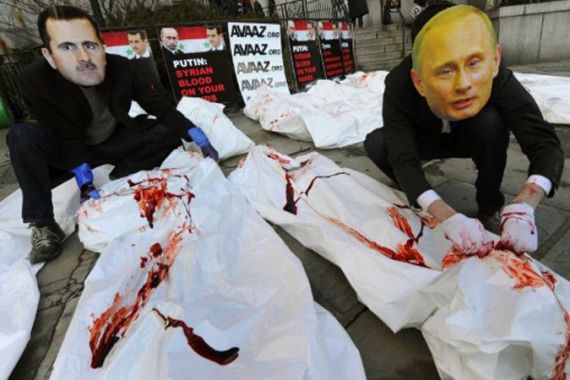Russia raises Western ire in support of Syria
Anxious to assert its authority in the Mediterranean, Moscow continues to stave off international action against Syria.

By choosing to back Syria President Bashar al-Assad and block a draft UN Security Council resolution calling for a transfer of power in his country, Russia seems to be placing itself as a counterbalance to NATO interests in the region.
Rim Turkmani, a member of the external Syrian opposition and an astrophysicist at the Imperial College of London, goes so far as to describe the Syrian crisis as a “proxy war” between Russia and the West.
Since the beginning of the country’s uprising in March, Moscow has supported the Syrian government with more than just rhetoric, reportedly concluding a $550m arms sales to Damascus.
In addition to using the arms sales to thumb its nose at talk of military intervention against Syria, Russia may also be looking to make up for lost revenue after sanctions prompted it to cancel missile sales to Iran.
Despite the cancellation, Russia has maintained its ties with Iran, a Syrian ally, by criticising the European Union embargo on Iranian oil.
All of this comes at a delicate time for Russia, itself having recently faced protests on the streets of Moscow over allegations of fraud in December’s parliamentary elections.
Russia also seems to be positioning itself as a mediator between the Syrian government and the country’s opposition – on the one hand supplying the state with weapons, on the other inviting the opposition to Moscow for talks.
The foreign ministry suggested on Monday that the two sides should meet in the Russian capital for “informal contacts” without any preconditions, an offer rejected by the opposition.
Turkmani said: “We rejected it because we don’t see it as being part of a solution. The only thing that we will accept is negotiations that would lead a transition of power.”
Libya factor
Russia is wary of endorsing international action in Syria, where it has a naval base at Tartous, near Latakia, after complaining that NATO and Western powers went beyond the UN remit in Libya, where fighting continues in some areas, and security is tenuous.
Moscow has gone so far as to say that Assad’s opponents are compelled to share the blame for the thousands of deaths since the start of the uprising in Syria in March 2011, and that it would block Western-backed intervention in the country.
“The Libyan precedent is absolutely key. Since the vote on resolution 1973, taken in March 2011, a number of Security Council members, including Russia, have kept voicing their opposition to NATO’s actions in Libya,” said Vincent Pouliot, professor of political science at McGill University in Montreal.
“In that sense, the Syrian deadlock owes a lot to the Libyan experiment. Moscow does not conceive of the Syrian crisis as a threat to international security.
“As a result it stands ready, together with Beijing, to veto Council action, as it has already done as early as last October.”
An intervention, either way
Fadi Salem, a Dubai-based researcher focusing on social media, citizen inclusion and open government in the Arab world, told Al Jazeera that no matter what Russia did, its actions would be condemned by some.
|
|
“Among the [Assad] loyalists, it would be seen as intervention if Russia sided with NATO, and among the opposition, Russia’s support of the regime is seen as intervention,” he said.
Aleksei Malashenko, scholar in residence at the religion, society and security programme at the Carnegie Endowment’s Moscow Centre, said Russia will ultimately lose its grip on Syria.
“Russia will lose Latakia. Arms sale will go on declining like everywhere,” said Malashenko.
He also dismissed rumours that Iran would allow for the construction of a Russian base within its borders.
“No one Iranian regime – Islamist, democratic even communist – will ever agree on that.”
Russia’s re-emergence
Russia’s influence with Syria and Iran is especially important, as public rifts emerge among permanent members of the Security Council.
“The Syrian case engenders new multilateral dynamics, with the Russians at the forefront of a push to limit Council interventions in internal violent crises,” says Pouilot.
“In the opposite corner stand the French, the British, the Americans, and several others, who want to take limited action to help mitigate violence on the ground.
“There is no doubt that Russia’s constructive contribution, if and when it comes, would be instrumental in putting an end to the bloodshed in Syria.”
Additionally, Russia’s alliance with Iran gives it credibility with Syrian government supporters, many of whom look at a state’s support for Israel as a litmus test.
“Through that lens, Russia is viewed as a friend, but Western countries supporting Israel are not,” said Salem.
Turkmani says the opposition continues to pressure the Kremlin into accepting a transfer of power in Syria and that this seems more possible now than ever before.